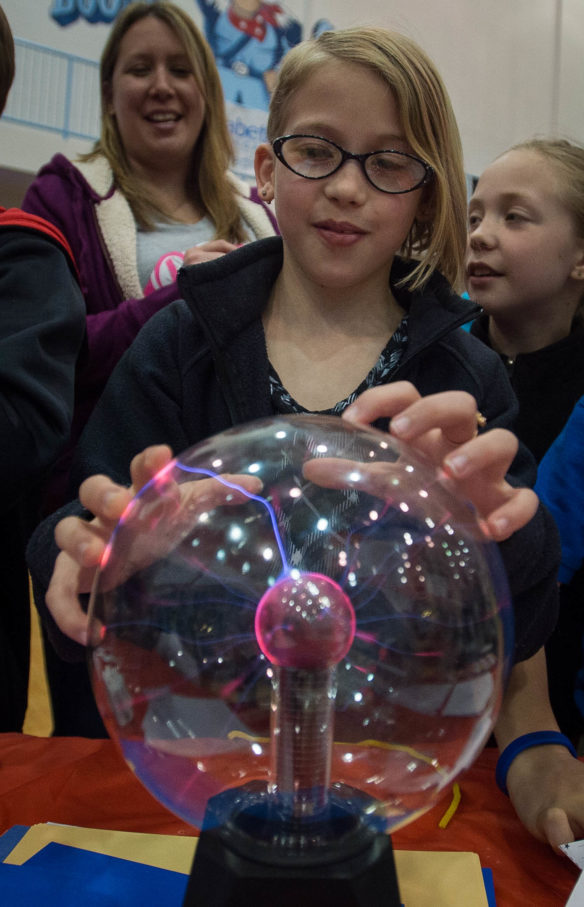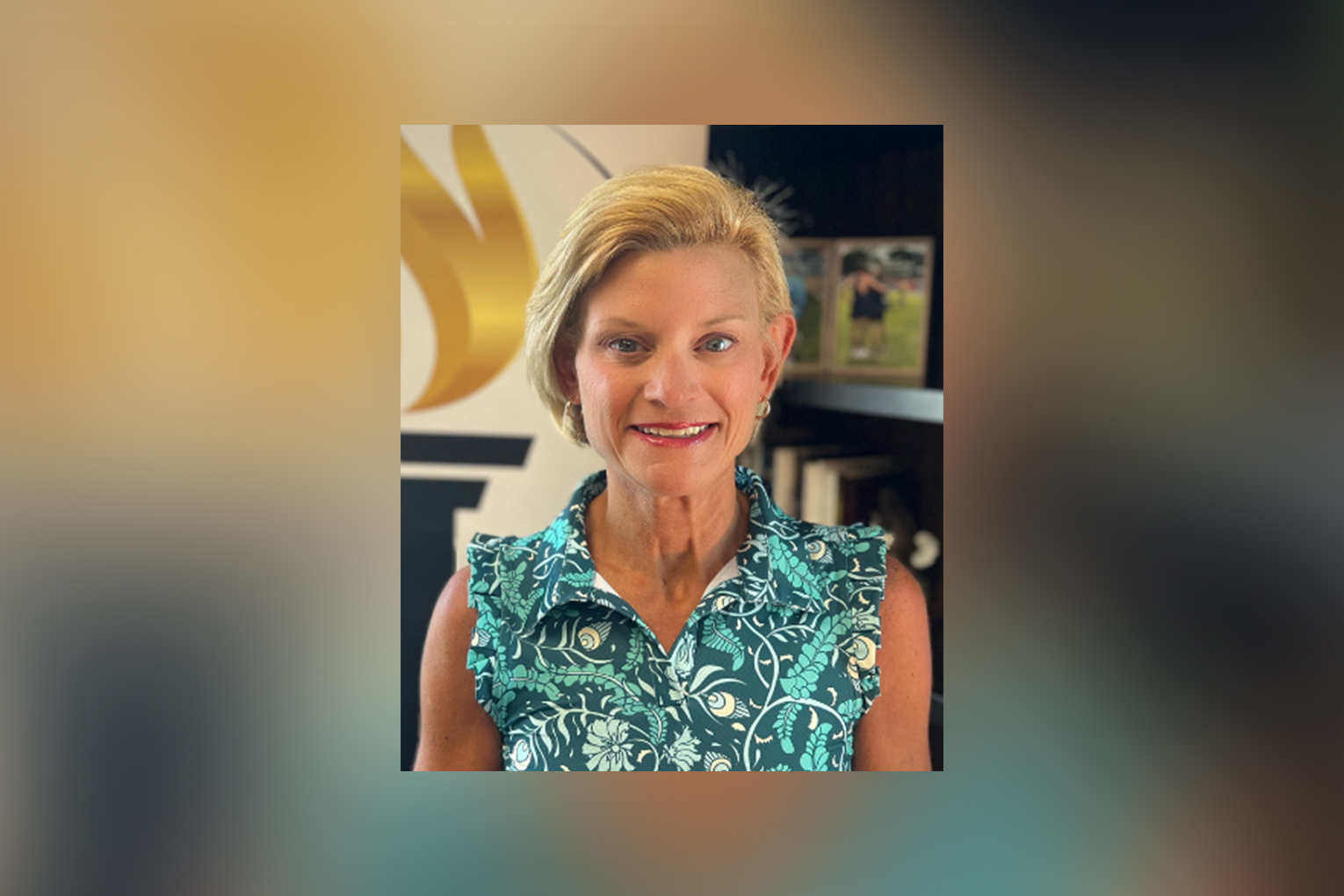
Molly Perez, a 3rd-grader at New Haven Elementary (Boone County), plays with a plasma globe at the first World Maker and Inventor Expo at Boone County High School.
Photo by Bobby Ellis, April 23, 2016
By Brenna R. Kelly
Brenna.kelly@education.ky.gov
On a recent morning, two high school students watched as they were recreated as brightly colored plastic forms.
The students, interns at the NKY MakerSpace, had scanned each other and then programmed a 3-D printer to sculpt miniature busts of themselves.
The project was just one of thousands that students from across Northern Kentucky have created since NKY MakerSpace – which was designed to allow students, teachers, parents and community members to explore and create with science, technology, engineering, arts and math – opened in April 2015.
The makerspace was the result of a collaboration between the Boone County school district, the Northern Kentucky Chamber of Commerce, area businesses and the community, said Ryan Kellinghaus, Boone County’s expanded learning opportunities coordinator. And it all came about because of students. The Brainy Bots, the robotics teams from Gray Middle School and Ryle High School, proposed the idea to the Boone County School Board and the chamber’s 2015 Leadership Northern Kentucky class.
“The Makerspace would be a place where kids and their families can create, invent, experience and get excited about science, technology, engineering and math,” the students wrote in a letter. “We know there are many jobs open in STEM and we want to make sure that students are prepared to go into those jobs.”
The leadership class agreed to spearhead the fundraising, the district found a building and area businesses donated both money and equipment, Kellinghaus said.
“It wasn’t really difficult to get local advanced manufacturers excited about this idea because our economy needs this,” he said. “They need more students coming out of school with the kind of skills that they learn at the makerspace.”
It also fit nicely into the Boone County school district’s focus on project-based and service learning, in which students use what they have learned to solve a problem for the benefit of the community, Kellinghaus said.
“When students are involved in projects like the kind of things they do here at the makerspace and service learning projects, you see them get really excited about education,” he said. “Especially for those students for whom traditional education hasn’t really worked, you will see them thrive in environments like this.”
The makerspace is open for field trips, internships and workshops. It has five rooms, including an engineering room, video and audio studio, robotics and coding room, an idea design room and a make your own room.
The engineering room is filled with gadgets to make electrical circuitry, virtual reality viewers and small programmable single-circuit computers with a processor core and memory called Arduinos. In the video and audio studio there are iMacs for video editing, green screens and audio mixing equipment. The robotics and coding room has Lego robotics, mini square-shaped robots called Cubelets and other robotics. In the make your own room, students can use a sewing machine, hand tools and a carving machine. The design room houses the 3-D printers, scanners and 3-D printing pens.
Students from all 25 Boone County schools came to the makerspace for field trips this year, Kellinghaus said. The field trips are open to any district and are free unless the classes use consumables, he said.
“It’s a very nontraditional field trip,” he said. “It’s not like going to the aquarium, the zoo or a play, where you are just kind of along for the ride. This is designed to be an extension of the classroom.”
Kellinghaus works with teachers before the trip to plan activities that fit into their lessons, he said. Teachers also come after school to explore the makerspace and tinker with the tools to learn how to incorporate them into a lesson, he said.
By the end of the school year, most of the 740 students at Erpenbeck Elementary will have visited the makerspace, said Kyle Holloway, the school’s STEM teacher.
“The nice thing is you can work with Ryan and pre-plan it and really do it the way you want,” he said. “And the excitement for the students to go over there and work with those types of materials is thoroughly engaging.”
During one field trip 1st-graders created junk monsters using recyclables as part of a science lesson.
“They had all the tools and resources to use in one place to make things, but they also partnered with the local recycling companies so that the students could learn about recycling first,” he said. “One of the great benefits of this makerspace is all the community partnerships built into one location.”
Erpenbeck has a STEAM lab with much of the same equipment as the makerspace, but the makerspace has more of the equipment, allowing more students to use it at the same time, he said. For schools without a STEAM lab or makerspace, Kellinghaus hopes that makerspace field trips will encourage them to get some maker-type tools.
“What we really want is a makerspace in every school, but we can’t afford to put a makerspace like this in every school, so it starts by giving access to students and teacher and parents,” Kellinghaus said. “When they come here, hopefully they go back to their school really excited and they will say ‘We need that here.’”
The makerspace celebrated its one-year anniversary in April with the World Maker & Inventor Expo at Boone County High School. More than 1,500 people from as far away as Louisville came to see STEM projects and create with makerspace tools, he said.
The makerspace interns showcased their projects at the expo. Students from four Boone County high schools interned with Kellinghaus this school year.
The students worked on projects with the chamber of commerce, Bosch Group, Toyota and other business. The interns also worked with the Boone County Animal Shelter to take pictures of the animals, create videos, commercials and other content for social media to help pets get adopted faster, he said.
“In project-based learning and service learning and makerspaces, the students are working on projects that are actually impacting their local and global communities and they are solving real problems,” Kellinghaus said. “What’s better than if at the end of a project when you get a grade, you don’t just get a grade, but you actually created something that a local nonprofit can use or you solved a problem in your community or school?”
MORE INFO …
Ryan Kellinghaus Ryan.Kellinghaus@Boone.kyschool.us








Leave A Comment